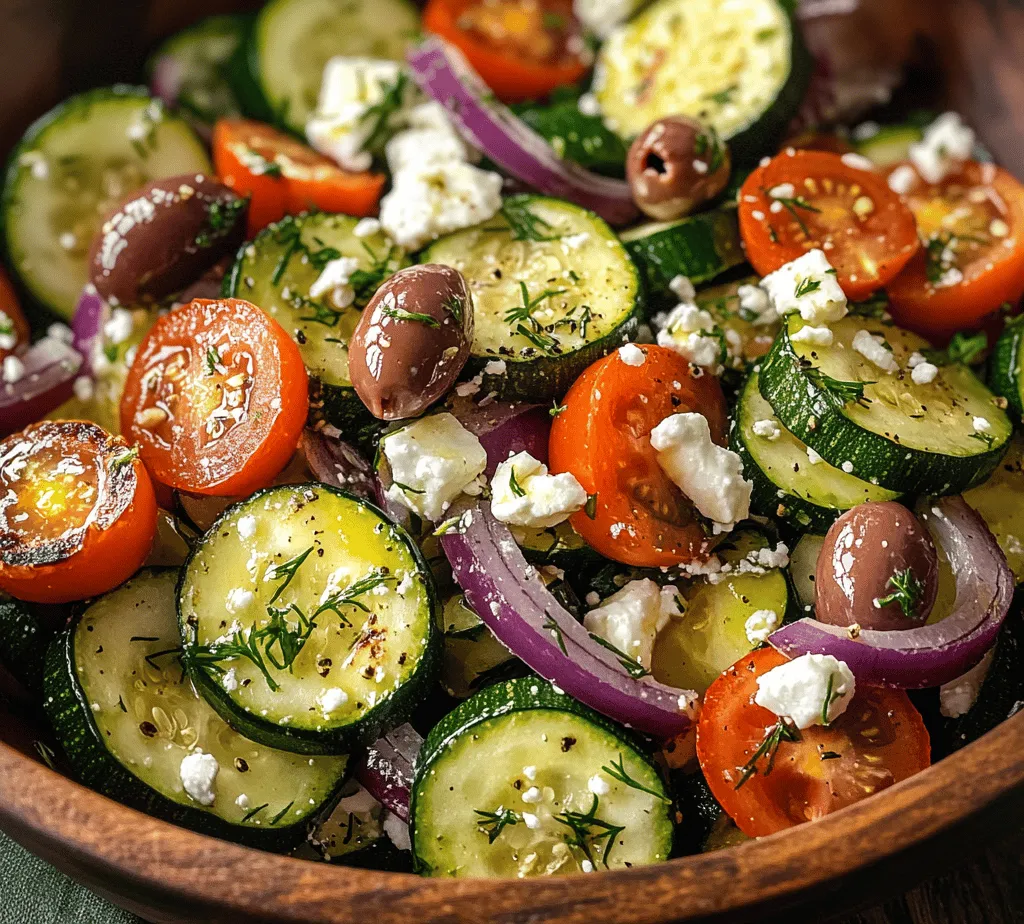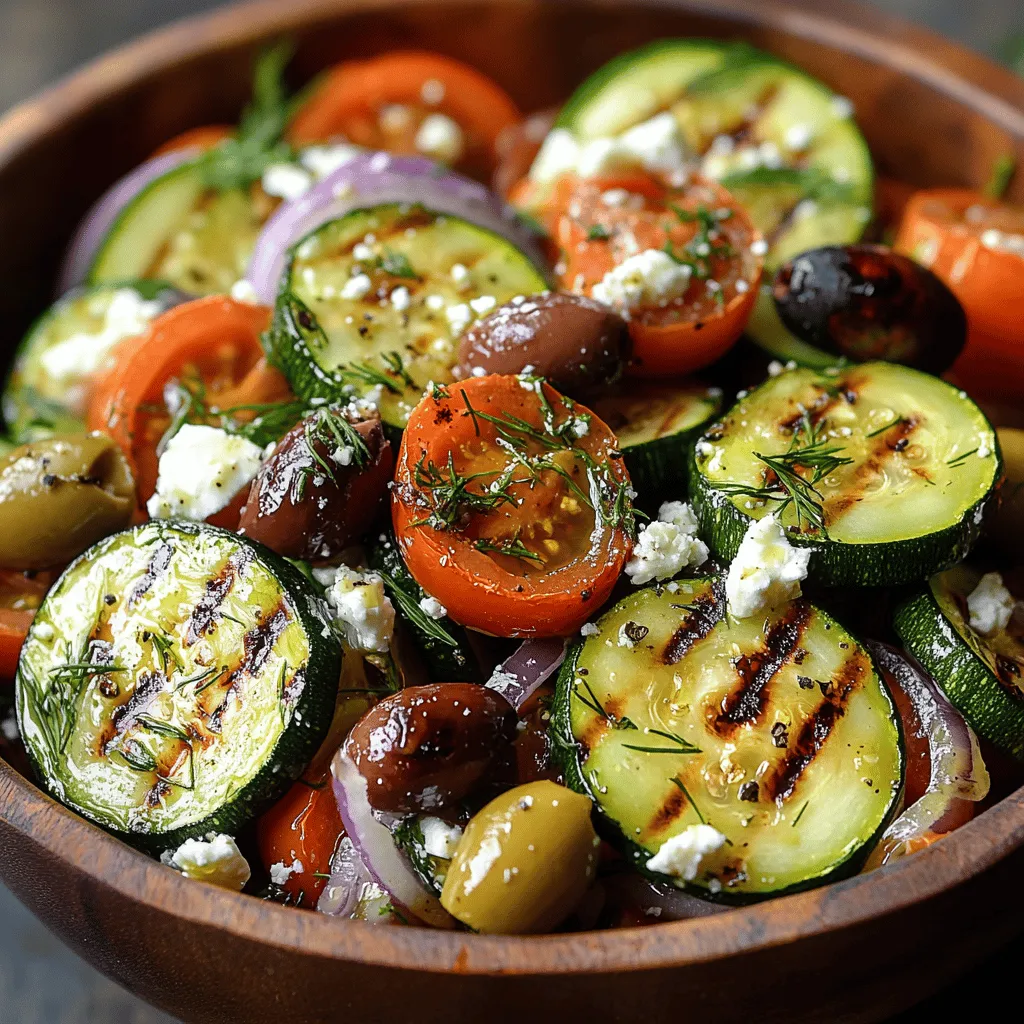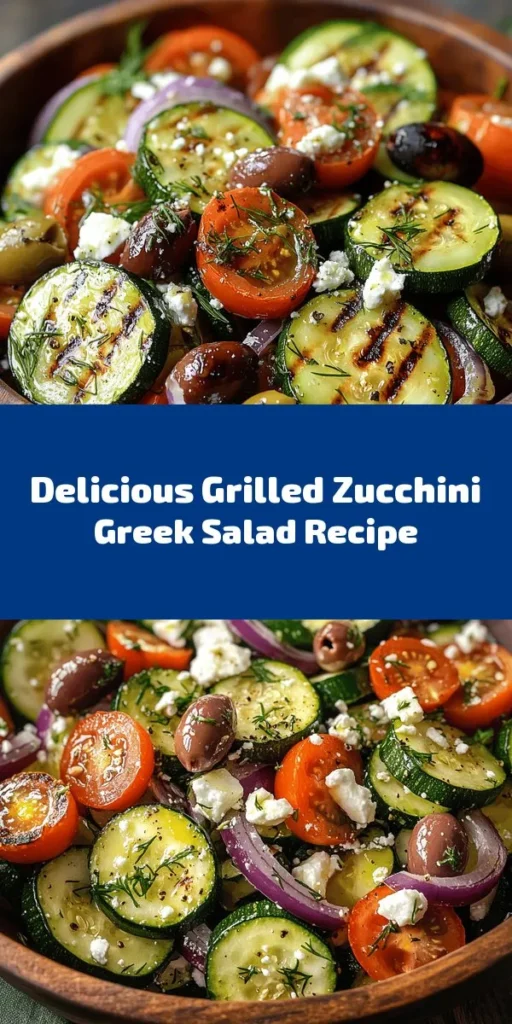Introduction
Greek salad, a staple of Mediterranean cuisine, is celebrated for its vibrant flavors, fresh ingredients, and health benefits. This traditional dish often features a medley of ripe vegetables, creamy feta, and a drizzle of high-quality olive oil, making it a favorite among health-conscious eaters and food enthusiasts alike. However, in our modern twist on this beloved classic, we elevate the dish by incorporating grilled zucchini, which adds a unique depth of flavor and a satisfying texture that perfectly complements the other ingredients.
Grilled zucchini not only enhances the overall taste but also contributes to the salad’s nutritional profile. Zucchini is low in calories and packed with essential vitamins and minerals, making it an excellent addition to any meal. By grilling the zucchini, we unlock its natural sweetness and create a smoky flavor that harmonizes beautifully with the fresh, crisp vegetables of the salad. This grilled zucchini Greek salad is not just a dish; it’s a celebration of summer produce and a healthier alternative to heavier salads.
The Essence of a Greek Salad
At the heart of any Greek salad lies a foundation of traditional ingredients that come together to create a dish bursting with flavor and nutrition. The classic components typically include ripe tomatoes, cucumbers, red onion, Kalamata olives, and feta cheese, all seasoned with a generous drizzle of olive oil and a sprinkle of oregano. These elements are not only delicious, but they also showcase the importance of using fresh, high-quality ingredients—a hallmark of Mediterranean cuisine.
Freshness is key in a Greek salad. Each component plays a critical role in flavoring the dish, with the juicy tomatoes providing a sweet and tangy contrast to the salty feta and briny olives. The cucumbers add a refreshing crunch, while the red onion contributes a mild sharpness that elevates the overall taste profile. Additionally, the aromatic herbs, particularly oregano and dill, infuse the salad with earthy notes that enhance the Mediterranean experience.
When preparing a Greek salad, it’s essential to prioritize seasonal produce. In the summer months, when tomatoes and cucumbers are at their peak ripeness, the flavors are unparalleled. This commitment to freshness is what sets Mediterranean cuisine apart, allowing the natural flavors of the ingredients to shine through.
Ingredient Breakdown
To create the perfect grilled zucchini Greek salad, we must carefully select each ingredient for its flavor and nutritional benefits. Here’s a closer look at the key components that make this dish a delightful and healthy treat.
Zucchini
Zucchini is a versatile vegetable that shines in various culinary applications, but grilling it brings out its best qualities. This summer squash is low in calories and high in vitamins A and C, making it an excellent choice for those looking to boost their vegetable intake. Grilled zucchini adds a smoky flavor that contrasts beautifully with the fresh vegetables in the salad.
When selecting zucchini, look for firm, unblemished specimens with a vibrant green color. To prepare, slice the zucchini into thick rounds or planks, brush with olive oil, and grill until tender and slightly charred. This simple technique enhances the natural sweetness of the zucchini while providing an appealing texture to the salad.
Olive Oil
The quality of olive oil can significantly impact the overall flavor of your Greek salad. Extra virgin olive oil is the gold standard for dressings due to its rich flavor and health benefits. It is cold-pressed from the first extraction of olives, preserving its natural antioxidants and healthy monounsaturated fats.
Using high-quality extra virgin olive oil not only enhances the salad’s taste but also provides heart-healthy benefits. It is known to reduce inflammation, promote healthy cholesterol levels, and support overall cardiovascular health. A generous drizzle of olive oil over the salad elevates the dish, creating a harmonious balance of flavors.
Cherry Tomatoes
Cherry tomatoes bring a burst of sweetness and juiciness to the salad, making them a favorite among salad lovers. Their vibrant color and small size make them visually appealing, and their flavor is often more intense than that of larger tomato varieties. Rich in vitamins C and K, as well as antioxidants like lycopene, cherry tomatoes provide numerous health benefits.
When selecting cherry tomatoes, opt for those that are firm and brightly colored, with no signs of blemishes. For the best flavor, consider using seasonal produce, as tomatoes harvested in peak season are sweeter and more flavorful. Halve the tomatoes before adding them to the salad to release their juices and blend their flavors with the other ingredients.
Cucumbers
Cucumbers are a quintessential ingredient in Greek salads, known for their crispness and refreshing quality. They are composed mostly of water, making them an excellent choice for hydration, especially during the hot summer months. In addition to their hydrating properties, cucumbers provide a source of vitamins K and C, as well as potassium.
When choosing cucumbers for your salad, look for firm, unblemished specimens. For a classic Greek salad, it’s common to use European cucumbers, which have thinner skin and fewer seeds. Slice them into bite-sized pieces or half-moons, depending on your preference, to maintain their satisfying crunch.
Red Onion
Red onion adds a mild, sweet flavor to the salad that perfectly complements the other ingredients. This vibrant onion variety is not only visually appealing but also packed with antioxidants and essential nutrients, including vitamins C and B6, manganese, and potassium. Moreover, red onions contain quercetin, a powerful antioxidant with anti-inflammatory properties.
To prepare red onion for your salad, slice it thinly to ensure that its flavor is well-distributed throughout the dish. If you’re sensitive to the sharpness of raw onion, consider soaking the slices in cold water for a few minutes to mellow their flavor before adding them to the salad.
Feta Cheese
Feta cheese is a quintessential ingredient in Greek salad, providing a creamy, tangy contrast to the fresh vegetables. Traditionally made from sheep’s milk or a combination of sheep’s and goat’s milk, feta is rich in protein and calcium, making it a nutritious addition to any dish. Its crumbly texture and salty flavor enhance the overall taste of the salad.
When choosing feta cheese, consider trying various types, including the traditional Greek feta and those made from cow’s milk. Each type has its unique flavor profile, allowing you to customize the salad to your liking. Crumble the feta over the top of the salad just before serving to maintain its texture and ensure that it doesn’t become too soggy.
Kalamata Olives
Kalamata olives are iconic in Greek cuisine, known for their deep purple color and rich, briny flavor. These olives are packed with healthy fats and antioxidants, making them a heart-healthy addition to your salad. They also provide a delightful contrast to the freshness of the vegetables and the creaminess of the feta cheese.
When selecting Kalamata olives, look for those that are plump and unpitted, if possible. Their robust flavor enhances the overall profile of the salad, and a handful of olives can go a long way in adding depth to the dish. If you prefer a milder flavor, consider using green olives or a mix of both varieties.
Fresh Dill
Fresh dill is an aromatic herb that adds a distinct flavor to the salad, enhancing its Mediterranean character. This herb is rich in vitamins A and C, as well as essential minerals like iron and manganese. It also boasts anti-inflammatory and antioxidant properties, making it a healthy addition to your meal.
When using fresh dill, opt for bright green sprigs with a fragrant aroma. Chop the leaves finely and sprinkle them over the salad to release their flavor. Dill pairs beautifully with the other ingredients, complementing the tanginess of the feta and the brininess of the olives.
By thoughtfully selecting and preparing each ingredient, you can create a grilled zucchini Greek salad that not only looks vibrant but also bursts with flavor and nutrition. This dish is perfect for summer gatherings, picnics, or as a healthy side for any meal. The combination of grilled zucchini and traditional Greek salad components offers a fresh take on a classic dish, ensuring that every bite is an explosion of flavor.

Red Wine Vinegar and Lemon Juice: The Role of Acidity in Balancing Flavors
In any salad, particularly one inspired by Greek cuisine, the components that create a harmonious balance are crucial. The combination of red wine vinegar and lemon juice not only adds brightness but also enhances the overall flavor profile of the Grilled Zucchini Greek Salad. Acidity is essential in cutting through the richness of ingredients like feta cheese and olive oil, providing a refreshing counterpoint that brings out the natural tastes of the vegetables. The tanginess from lemon juice adds a zesty kick, while the red wine vinegar introduces a complexity that complements the grilled zucchini and other salad components. This balance of flavors is what makes each bite of this salad a delightful experience.
Dried Oregano: Its Importance in Greek Cuisine
Dried oregano is a cornerstone of Greek cuisine, known for its aromatic and slightly bitter flavor that plays well with a variety of ingredients. In this Grilled Zucchini Greek Salad, dried oregano not only adds depth and character but also infuses the dish with the essence of Mediterranean cooking. Oregano pairs beautifully with the zucchini, tomatoes, and feta cheese, enhancing their natural flavors. Additionally, it brings health benefits such as antioxidant properties and potential anti-inflammatory effects. Using high-quality dried oregano will elevate your salad and bring an authentic taste of Greece to your table.
Preparation Steps Explained
Step 1: Prepping the Grill and Zucchini
Before grilling, it’s important to select fresh, firm zucchinis. Wash them thoroughly and slice them into even, thick rounds, about half an inch thick. This thickness ensures that the zucchini cooks through without becoming mushy, allowing for the perfect grill marks and texture. Preheat your grill to medium-high heat and lightly oil the grates to prevent sticking. You can use a paper towel dipped in olive oil or a non-stick cooking spray for this purpose. Once the grill is hot, place the zucchini slices on it, making sure they are spaced apart to allow for even cooking. Grill the zucchini for about 4-5 minutes on each side or until you see nice grill marks and the zucchini is tender but still has a slight bite.
Step 2: Creating the Salad Base
While the zucchini is grilling, it’s time to prepare the salad base. Start by chopping fresh romaine lettuce or a mix of your favorite greens, such as arugula or spinach. Place the greens in a large salad bowl to create a light and crisp foundation for the salad. Add diced cucumbers, cherry tomatoes, and red onions to this base. The cool, crunchy cucumbers and juicy tomatoes will add freshness, while the red onions provide a mild sharpness that complements the other flavors. Layering these ingredients will ensure that every bite has a balance of flavors and textures.
Step 3: Mixing the Dressing
To create a flavorful dressing, whisk together the red wine vinegar, lemon juice, olive oil, minced garlic, dried oregano, salt, and pepper in a small bowl. The key to a successful dressing is achieving the right balance between acidity and seasoning. Taste the dressing as you mix, adjusting the salt and pepper to your preference. If you prefer a sweeter dressing, consider adding a pinch of honey or agave syrup. The acidity from the vinegar and lemon, combined with the richness of the olive oil, will tie the salad together beautifully.
Step 4: Combining the Ingredients
Once the grilled zucchini has cooled slightly, it’s time to combine all the ingredients. Gently toss the salad greens, cucumbers, tomatoes, and red onions in the large bowl. Add the grilled zucchini and crumbled feta cheese on top. When adding the dressing, drizzle it evenly over the salad, but do not drown it. Using a pair of salad tongs or your hands, gently toss the salad to combine everything without breaking apart the zucchini or feta. This technique will help maintain the integrity of the ingredients while ensuring that every piece is coated in the flavorful dressing.
Step 5: Presentation
Presentation is key when serving your Grilled Zucchini Greek Salad. Consider serving it in a large, shallow bowl or on a platter for a more rustic look. Garnish the salad with additional crumbled feta, a sprinkle of dried oregano, and perhaps a few olives for added flavor and visual appeal. Fresh herbs like parsley or basil can also enhance the presentation. This salad can be served immediately or chilled for a short time to let the flavors meld together.
Nutritional Benefits of Grilled Zucchini Greek Salad
The Grilled Zucchini Greek Salad is not only delicious but also packed with nutritional benefits that align with the principles of a Mediterranean diet. This diet is recognized for its potential benefits in reducing the risk of heart disease, obesity, and diabetes. The salad is rich in vitamins, minerals, and antioxidants from the fresh vegetables, while the olive oil offers healthy monounsaturated fats.
Caloric Content and Macronutrient Breakdown
A typical serving of Grilled Zucchini Greek Salad (without added proteins) contains approximately 180-220 calories, depending on the amount of oil and cheese used. It generally consists of:
– Carbohydrates: 10-15 grams from the vegetables and dressing.
– Protein: 6-8 grams primarily from feta cheese.
– Fats: 10-15 grams from olive oil and feta cheese.
This salad is an excellent choice for those following vegan or vegetarian diets, especially when feta is omitted or replaced with a plant-based alternative. It is also gluten-free, making it suitable for various dietary preferences.
Pairing Suggestions
To elevate your dining experience, consider pairing the Grilled Zucchini Greek Salad with complementary main dishes and beverages.
Ideal Main Dishes
– Grilled Chicken or Fish: The lightness of grilled chicken or fish, such as salmon or tilapia, pairs wonderfully with the salad, enhancing its Mediterranean essence.
– Lamb Skewers: For a more authentic Greek experience, serving this salad alongside succulent lamb skewers marinated in herbs and spices is a fantastic choice.
– Stuffed Peppers: Vegetarian stuffed peppers filled with rice, herbs, and cheese can serve as a hearty complement to the fresh salad.
Beverage Pairings
– Wines: A crisp, dry white wine such as Sauvignon Blanc or a light rosé can beautifully enhance the flavors of the salad. If you prefer reds, a light-bodied red like Pinot Noir can work as well.
– Cocktails: For a refreshing cocktail, consider a classic gin and tonic or a Mediterranean spritz made with Aperol, prosecco, and a splash of soda.
– Non-Alcoholic Options: Sparkling water infused with lemon and mint or a refreshing iced herbal tea can provide a delightful non-alcoholic pairing that complements the salad’s flavors.
Conclusion
In summary, the Grilled Zucchini Greek Salad is a vibrant, nutritious dish that beautifully marries the crispness of fresh vegetables with the warmth of grilled zucchini and the tanginess of feta and dressing. Its health benefits align with the Mediterranean diet, making it a smart choice for a balanced meal. This salad is incredibly versatile and can be easily adapted to suit various tastes and dietary preferences, whether you’re vegan, vegetarian, or simply seeking a nutritious side dish.
As you plan your seasonal meals, consider incorporating this salad into your rotation for its fresh and vibrant flavors. The Grilled Zucchini Greek Salad embodies the essence of Greek cuisine, showcasing how simple ingredients can come together to create something truly delicious. Embrace the versatility of Greek salads and experiment with different ingredients to find your perfect combination. Enjoy the delightful experience of crafting and savoring this dish, and share it with friends and family to spread the joy of healthy eating!



